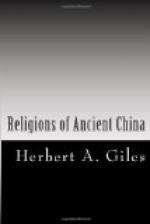For three days before sacrificing to ancestors, a strict vigil and purification was maintained, and by the end of that time, from sheer concentration of thought, the mourner was able to see the spirits of the departed; and at the sacrifice next day seemed to hear their very movements, and even the murmur of their sighs.
The object of the ceremony was to bring down the spirits from above, together with the shades of ancestors, and thus to secure the blessing of God; at the same time to please the souls of the departed, and to create a link between the living and the dead.
“The object in sacrifices is not to pray; the time should not be hastened on; a great apparatus is not required; ornamental details are not to be approved; the victims need not be fat and large (cf. Horace, Od. III, 23; Immunis aram, etc.); a profusion of the other offerings is not to be admired.” There must, however, be no parsimony. A high official, well able to afford better things, was justly blamed for having sacrificed to the manes of his father a sucking-pig which did not fill the dish.
Religious Dances.—“The various dances displayed the gravity of the performers, but did not awaken the emotion of delight. The ancestral temple produced the impression of majesty, but did not dispose one to rest on it. Its vessels might be employed, but could not be conveniently used for any other purpose. The idea which leads to intercourse with spiritual Beings is not interchangeable with that which finds its realisation in rest and pleasure.”
Priestcraft.—From the ceremonial of ancestor worship the thin end of the wedge of priestcraft was rigorously excluded. “For the words of prayer and blessing and those of benediction to be kept hidden away by the officers of prayer of the ancestral temple, and by the sorcerers and recorders, is a violation of the rules of propriety. This may be called keeping in a state of darkness.”
Confucius sums up the value of sacrifices in the following words. “By their great sacrificial ceremonies the ancients served God; by their ceremonies in the ancestral temple they worshipped their forefathers. He who should understand the great sacrificial ceremonies, and the meaning of the ceremonies in the ancestral temple, would find it as easy to govern the empire as to look upon the palm of his hand.”
Filial Piety.—Intimately connected with ancestral worship is the practice of filial piety; it is in fact on filial piety that ancestral worship is dependent for its existence. In early ages, sons sacrificed to the manes of their parents and ancestors generally, in order to afford some mysterious pleasure to the disembodied spirits. There was then no idea of propitiation, of benefits to ensue. In later times, the character of the sacrifice underwent a change, until a sentiment of do ut des became the real mainspring of the ceremony. Meanwhile, Confucius had complained that the filial piety of




